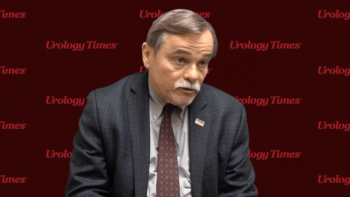
"I think that coping is a key way that we can help intervene here," says Elisabeth M. Sebesta, MD.

"I think that coping is a key way that we can help intervene here," says Elisabeth M. Sebesta, MD.

"One day, we're going to have to move away from fee for service, so we'd be wise to try to navigate those waters ahead of time, so we're not left dealing with the aftermath when someone else has implemented it for us," says Ruchika Talwar, MD.

"In terms of the psychosocial aspect of things, people with toilet insecurity are more likely to experience greater stress and anxiety, report poorer social support, have a poor overall perception of their health, even after controlling for some confounders," says Elisabeth M. Sebesta, MD.

"17% answered positively to 1 of our questions indicating they might be at risk for some sort of home toilet or sanitation insecurity, or at least they experienced some sort of worry or stress about having access consistently to a working toilet in their home," says Elisabeth M. Sebesta, MD.

"In [bladder cancer], many women's diagnosis is delayed because their hematuria or microscopic hematuria is blamed on urinary tract infections rather than cancer," says Amy Luckenbaugh, MD.

Roger R. Dmochowski, MD, MMHC, highlights the FDA approval of the Revi System, specifically touching on how the device may be used as a potential earlier line of therapy for patients with OAB.

"It is important as a field that we recognize the potential emotional impact of surgical adverse events," writes Amy N. Luckenbaugh, MD.

"I think in terms of the 2 large tool sets we have, biomarker testing through urine or blood tests and imaging. I think both are only going to get better," says Jeffrey Tosoian, MD, MPH.

"At a time when patients are increasingly concerned about prescription drugs, this information will provide a useful starting point for making essential medications as affordable as possible," says Ruchika Talwar, MD.

The therapy, known as Autologous Muscle Derived Cells for Urinary Sphincter Repair (iltamiocel), involves a medical procedure in which a participant’s own muscle cells are collected, processed, and then injected into the tissues of the urinary passage.

"There's...this concept of the virtualist; truly, the virtual urologist who has a potentially full-time telehealth practice but geared toward really delivering care, and these positions exist," says Kara L. Watts, MD.

Data showed that treatment with radical prostatectomy was associated with worse urinary incontinence but not worse sexual function compared with other treatment options, regardless of cancer risk.

In this final episode, panelists conclude with reflections on the significant progress made in treating NMIBC over the past decade, particularly in the last 5 years. Looking ahead to 2024, experts in urology express excitement about investigational treatments (ie, cretostimogene grenadenorepvec and UGN 102), the potential for personalized medicine, emphasizing the need to understand molecular characteristics of the disease for better treatment customization. The session also highlights the importance of balancing quality of life with effective treatment strategies, and the prospect of utilizing emerging therapies early in the disease process.

This video segment explores various investigational strategies, including the use of agents like UGN 102, and recent clinical trials for intermediate-risk NMIBC. The conversation highlights the importance of balancing side effects with efficacy and the shift towards non-surgical management in treating intermediate-risk NMIBC and in the BCG-naive population.

"There's just a tremendous opportunity for telehealth and being able to increase delivery to patients in these areas or at least reduce their amount of travel time to get to see a urologist based on where they live," says Kara L. Watts, MD.

This video episode discusses various new therapies and strategies for treating patients with high-risk BCG-unresponsive NMIBC. It includes a review of nadofaragene firadenovec-vncg, its FDA approval, dosing schedule, and patient response rates. The conversation also explores the practical aspects of treatment, such as the balance between efficacy and treatment frequency, and the potential sequencing of therapies in clinical practice.

This video segment provides insights into various innovative trials and agents being explored for high-risk BCG-unresponsive NMIBC. The discussion covers a range of approaches including oncolytic immunotherapy, gene therapy, systemic IO agents, antibody-drug conjugates, and cytokine therapies. It emphasizes the need for personalized dosing regimens based on individual immune responses and highlights the significance of longer-term efficacy evaluations beyond initial three-month response rates.

This episode provides an in-depth discussion on Cretostimogene Grenadenorepvec (CG), an investigational agent for high-risk BCG-unresponsive NMIBC, including the mechanism of action, its efficacy and safety data from clinical trial trials like CORE01 and BOND-003 (NCT04452591), and the rationale behind combining CG with anti-PD-1/PD-L1 antibodies. Experts also provide their insights on future directions in clinical development and application of CG in various NMIBC treatment scenarios, such as a monotherapy and in combination with IO, including its potential use in intermediate-risk disease.

This episode explores the potential of emerging therapies in providing effective treatment alternatives for challenging NMIBC cases. Current clinical trials and investigational treatments for high-risk, BCG-unresponsive NMIBC are highlighted, including the use of N-803, an IL-15 superagonist, in combination with BCG, and discusses TAR-200, an intravesical drug delivery system, which releases gemcitabine directly into the bladder over time.

Sam S. Chang MD, MBA leads a discussion of various treatment approaches for a hypothetical case of a 74-year-old female patient with T1 bladder cancer and associated CIS, exploring the necessity of repeat resections. The conversation emphasizes the importance of personalized treatment plans, considering BCG therapy, clinical trials involving immunotherapy, and the possibility of cystectomy, while also addressing the complexities and risks associated with high-grade bladder cancer in elderly patients.

This episode focuses on the complex management of recurrent low-grade bladder tumors and highlights the limitations and challenges of current treatments, including intravesical chemotherapy and BCG, and underscores the need for better therapies and clinical trials in this area.

The various treatment approaches for NMIBC in the context of a BCG shortage, with a focus on initial cases, are shared. Urologists discuss their strategies for treating a hypothetical patient with a 3 cm bladder tumor, weighing options like perioperative chemotherapy, the importance of thorough resection, and adapting treatment protocols based on tumor characteristics and the ongoing BCG shortage.

The impact of the BCG shortage on the treatment of bladder cancer, exploring various strategies adopted by urologists to optimize patient care. The conversation highlights the importance of risk stratification in deciding treatment protocols, considering factors like tumor size, location, multifocality, and histology, as well as patient age and overall health.

Amy Luckenbaugh, MD, is an assistant professor of Urology at Vanderbilt University Medical Center.

Experts discuss grading, staging, and risk stratification of Non-Muscle Invasive Bladder Cancer (NMIBC). Panelists highlight differentiation between the risks of recurrence and progression, emphasizing the importance of categorizing patients into low, intermediate, and high-risk groups based on various factors, including tumor size, grade, and history of recurrence. The importance of continuous prospective observation of patients with NMIBC is emphasized.

Experts in urology discuss the importance of evaluation to accurately identify the stage and grade of NMIBC, which plays a crucial role in determining the risk category focusing on the distinction between low and high-grade tumors and the significance for each patient with NMIBC.

“When it comes to this, I think having a great team around you is really so important,” says Bree Duncan, RN, BSN.

“I think being younger and going through something so scary, I think it's been really important to her to have someone with her throughout the whole process,” says Bree Duncan, RN, BSN.

“We found that these genetic proxies of thiazide diuretics were associated with a 15% lower risk of kidney stones,” says Jefferson Triozzi, MD.

"There are a lot of questions and issues regarding [topics] like body image and sexual function, and things like that, that also, being a woman in this role, I feel like they feel comfortable asking me those questions," says Bree Duncan, RN, BSN.